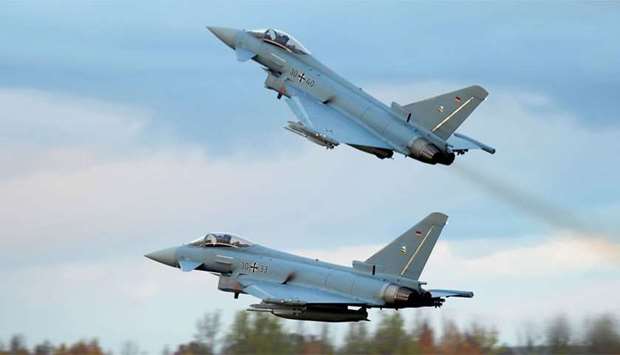Two Bundeswehr fighter jets forced a Korean Air passenger plane to land at Stuttgart Airport late Saturday night, after the aircraft lost radio contact with air traffic control.
The plane was on its way from Seoul to Zurich when radio contact cut out, a spokesperson for Stuttgart Airport told dpa.
The reason for the connection loss was initially unclear.
The jets caused a sonic boom over the south-western city of Stuttgart as they attempted to chase down the plane.
After the landing, the 200 passengers were forced to spend the night at the airport. An onward flight was not possible due to an overnight flight curfew and no sufficient accommodation was able to be
organized, the spokesperson said.
On Friday evening, two Bundeswehr jets were also sent after an Egyptian passenger plane in southern Germany after it was unable to be contacted by air traffic control.
A forced landing wasn't required in that instance though, after the aircraft eventually got in contact via radio.
Israel-Palestinians-conflict-Jerusalem-religion Jerusalem, July 16, 2017 () - Israeli authorities were to reopen the holy site Sunday closed after an attack that killed two policemen, but new security measures including metal detectors and cameras were being put in place.
Police spokeswoman Luba Samri said the metal detectors were being installed at entrances to the holy site and cameras were also being mounted in the area.
It was to be reopened gradually, police said, without providing details.
Israeli Prime Minister Benjamin Netanyahu spoke of the security measures late Saturday before departing for a trip to Paris.
"This evening I held a discussion with the top security leadership and I instructed that metal detectors be placed at the entrance gates to the Temple Mount," he said.
"We will also install security cameras on poles outside the Temple Mount but which give almost complete control over what goes on there."
Netanyahu spoke by phone with Jordan's King Abdullah II on Saturday night, a statement from Amman said.
Abdullah condemned the attack, but also called on Netanyahu to reopen the Al-aqsa compound and stressed the need to "avoid any escalation at the site."
The new security measures are likely to be controversial.
A plan developed in 2015 between Israel and Jordan to install cameras at the site itself fell apart amid disagreement over how they would be operated.
The Haram al-Sharif/Temple Mount is central to the Israeli-Palestinian conflict, with Palestinians fearing Israel may one day seek to assert further control over it.
It is located in east Jerusalem, occupied by Israel in 1967 and later annexed in a move never recognised by the international community.
It is considered the third holiest site in Islam and the most sacred for Jews.
Jews are allowed to visit but not pray there to avoid provoking tensions.

Bundeswehr fighter jets. File picture
